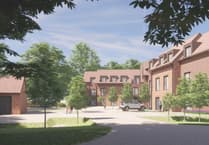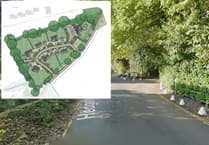Councillors passed sweeping changes to Waverley Borough Council’s planning system earlier this month that will see councillors banned from voting on planning applications in their wards and decisions for all developments of ten homes or fewer made by paid planning officers. In a column for last week’s Herald, Waverley deputy leader Peter Clark (Farnham Residents, Rowledge) defended the changes as a necessity to avoid government special measures. But this week, his Conservative counterpart CAROLE COCKBURN (The Bourne) hits back...
Councillor Clark’s statement last week, in defence of the Farnham Residents’ decision to remove the local voice from planning committees, was quite extraordinary.
In all the evidence we were shown from the Planning Advisory Service, there was not one suggestion that a single committee would solve any of Waverley’s current planning difficulties. It has been tried once and was not successful.
Quite simply, the executive has failed to run an efficient and effective planning service for the past four years and is presumably hoping that this grand gesture, rushed through with undue speed, will divert attention from its multiple failings.
I am no fan of the planning system but I have served as a councillor under Labour, the Conservative/LibDem coalition and now under the Conservatives and little changes. Governments of all colours retain the power to intervene, when local planning authorities are incompetent. If the planning authority has a robust Local Plan, which delivers the required level of housing, all decisions are taken locally and there are far fewer appeals.
As a result of its complete inability to plan properly and take timely decisions, the Waverley executive does not have an updated Local Plan and cannot demonstrate a sufficient supply of housing land. These facts weaken all planning documents, including Neighbourhood Plans. This was stated clearly by KCs at all the recent planning appeals in Farnham.
A single planning committee alone will not deliver better outcomes or greater consistency. Only better training of officers and members will achieve that. All relevant documents and each policy should be read and understood by everyone involved in decision making.
As for his comments on Farnham councillors, what on earth was Cllr Clark suggesting? That the new committee somehow favours Farnham?
If that were true, it would be grossly unfair to all other parts of the borough. Was he really saying that a Farnham Residents chairman can be anything other than impartial? What utter nonsense!
The label you stand under is irrelevant on a planning committee. Decisions are made on policy and context and there is no substitute for informed debate, led by ward councillors who know the area in which the application sits. That is why the geographical committees worked.
Planning committees deal only with large applications or smaller applications, which are very much “on balance” and ward councillors understand the subtleties of the situation better than anyone. They should continue to play a full part in the debate.
When a new agenda is published, all committee members are supposed to read in depth the officers’ reports and study any other relevant documents. They will come to the meeting with a natural predisposition but an open mind.
To suggest that all ward members are predetermined on all applications within their wards is plain daft and councillors are quite capable of giving objective advice on procedure to any resident. If the applicant or main objector is a friend or family member, councillors have always declared that interest and absented themselves from the chamber for the whole debate.
These rushed changes are all about further reducing the role of councillors in planning. The great majority of planning applications are already determined by officers under delegated powers and this measure seeks to remove local democracy from the final debate on those applications that do come to committee.
In brief, this committee has been created with unseemly haste, simply to nod through applications from across the borough on any sites that officers deem appropriate, regardless of whether they comply with policy in neighbourhood plans.
If committee members don’t have a clue about the character of the area in which an application sits or have not studied the relevant neighbourhood plan in sufficient detail, they will blindly follow the officers’ recommendation to grant permission.
There are many words to describe the ongoing centralising of power at Waverley but democracy and localism are certainly not included in the list.
By Carole Cockburn
Deputy leader, Waverley Borough Council Conservative Group
Find out about planning applications that affect you by visiting the Public Notice Portal.
Borough councillor for The Bourne





Comments
This article has no comments yet. Be the first to leave a comment.